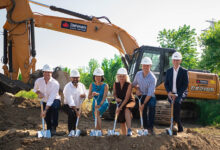Bolder, quicker, more inclusive: How Toronto city hall could adapt to a post-pandemic world

Whether it happened by necessity or through a sense of opportunity, Toronto’s municipal government has demonstrated a previously untapped ability to move quickly and boldly during the COVID-19 pandemic, say observers and advocates at city hall.
Toronto expands bike share program ‘into all corners’ of city during pandemic
It’s a way of doing business that should continue, they say, even after the pandemic ends.
“We’ve seen a lot of very quick responses, some really interesting innovations,” said Caryl Arundel, the interim executive director of the advocacy group Social Planning Toronto.
“But on the other hand, the problems are so big, they have to do more and they have to do it faster.”
‘Chaos creates opportunity’
Arundel is among the long-time city hall watchers who say Toronto’s actions during the pandemic should not be viewed as a temporary break from normal business, but rather as a new standard for decision-making that would better serve residents.
She says a bolder and more decisive local government will be required to tackle the city’s greatest challenges, such as affordable housing and deep-rooted disparities along racial and socio-economic lines.
The city’s actions during the pandemic show that real transformation is possible, she says, but only if there is a willingness to commit to long-term changes.
“Our history is being more thoughtful and cautious,” Arundel told CBC Toronto. “We have this window to act now. We have to change the way things are.”
Leslie Woo, CEO of the local non-profit CivicAction, said residents should take the pandemic as a sign of what’s possible and demand improvements to the efficiency and effectiveness of Toronto’s local government.

“I think it is our duty as a civil society to ensure that all the benefits that have emerged out of this pandemic in terms of engagement and collaboration continue,” she said.
“Chaos creates opportunity.”
Woo says the city should consider allowing residents to virtually participate in meetings long-term. She says the move would likely increase the diversity of participants while making it easier for people to be involved in important policy decisions.
City delivers on multiple major projects
Since declaring a state of emergency in March, observers say the city has displayed a heightened ability to conceive and roll out ambitious projects, which in previous years could have been bogged down by the city’s frequently slow-moving bureaucracy.
Projects delivered during the pandemic include:
- The installation of approximately 40 kilometres of new bike lanes.
- The opening of approximately 2,300 new shelter spaces at 23 locations.
- The construction of 100 modular homes, with another 150 to be built next year.
- Weekend road closures to promote active transportation.
- Temporary permits for sidewalk and curb lane patios.
“I think we’ve proven that we can work together,” said Mayor John Tory when asked to appraise city council’s performance during the pandemic.
Tory points to the city’s ongoing work at developing public transit and building affordable housing, which he says has been largely unaffected by the pandemic.
“Yes, there are vigorous debates, but in the end, we got a lot accomplished because we’ve decided that we’re not going to let polarization and division take hold of this place.”

City council meets Wednesday and Thursday for its final session of a tumultuous and busy year. But since March, all city council and committee meetings have been held virtually, which has appeared to reduce instances of shouting and arguing among councillors that sometimes interrupted in-person sessions.
Outside observers like Arundel agree that the city has displayed a knack for productivity while adapting to the conditions of the pandemic.
But she quickly noted that Toronto’s most pressing challenges are far from being resolved.
Some of those issues, such as transit and affordable housing, are often tied up in the complexities of funding and regulations from higher levels of government.
But Arundel pointed to recent projects such as the city’s commitment to build modular housing units as evidence that creative solutions can be effectively used to take on complicated challenges.
She said the city’s willingness to pursue unconventional projects, and to do so quickly, have served the city well during the pandemic.
“Can you imagine if they could do that all the time and just make things happen?” Arundel said.








Redes Sociais - Comentários